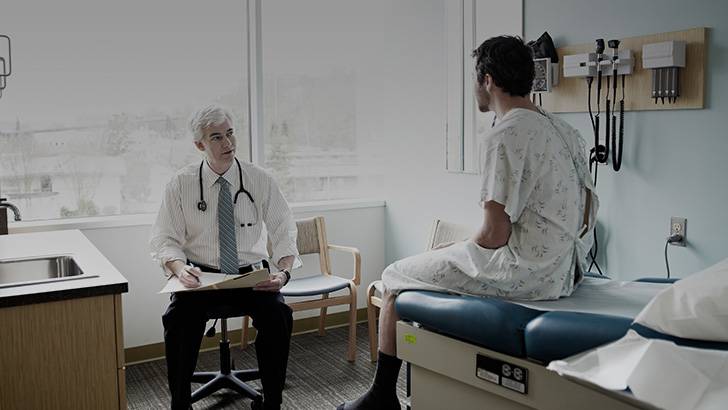Transcript
Announcer:
You’re listening to ReachMD. This medical industry feature titled “Hereditary Angioedema: A Perspective on Prophylactic Treatment” is sponsored by Takeda. This program is intended for physicians in the United States.
Here’s Dr. Timothy Craig now.
Dr. Craig:
I’m Dr. Timothy Craig, Professor of Pulmonary, Allergy, and Critical Care Medicine at Pennsylvania State University. I’m here to talk about one treatment option for a rare and debilitating disease called hereditary angioedema. This discussion is especially important because in the past, hereditary angioedema prevention and treatment options were limited in the U.S.1,2 But before we explore current treatment options, let’s start with some background. Hereditary angioedema, which is commonly referred to as HAE and can affect both adults and children, is a rare genetic disease that can cause recurrent, unpredictable, and potentially life-threatening attacks of swelling in the body.1 Typically, in people with HAE, an important protein in their blood called the C1-inhibitor is either missing or dysfunctional.3 This can cause another protein, kallikrein, to become overactive, which results in too much bradykinin, the substance that causes HAE attacks.3 This disease is often misunderstood and misdiagnosed, and it can make performing everyday tasks extremely difficult for patients. Laryngeal HAE attacks have the potential to become life-threatening.4 HAE attacks can be triggered by certain activities or events, such as emotional stress, minor trauma or surgery, dental work, medical procedures, infection, or mechanical pressure from repetitive physical activities, like mowing the lawn or using scissors.2,5
Now, there are three main types of treatment for HAE: on-demand, short-term preventive, and long-term preventive. On-demand, or acute treatment, is used to treat the symptoms of an HAE attack.2 Short-term, or pre-procedural, prophylaxis is used to prevent attacks before known precipitants.2 And preventive, or prophylactic treatments, help prevent or reduce the frequency and severity of HAE attacks.2 One long-term preventive therapy is lanadelumab-flyo, also known as TAKHZYRO. Hypersensitivity reactions have been observed with TAKHZYRO. In case of severe hypersensitivity reaction, discontinue TAKHZYRO administration and institute appropriate treatment.6 Please continue listening until the end of the program for additional important safety information about TAKHZYRO.
Announcer:
Since launch of program, TAKHZYRO is now approved as a routine prophylaxis treatment for children 2 to <12 years of age.
Dr. Craig:
Given the many medicines that are now available in the U.S. and the clinical advancements in HAE research, the U.S. Hereditary Angioedema Association, or the HAEA, Medical Advisory Board published guidelines in 2020 to assist physicians in creating a care plan for the treatment and management of HAE.2 These guidelines recommend a preventive treatment for appropriate HAE patients. The HAEA says the decision on when to use long-term prophylactic treatment cannot be made on a rigid criteria but should reflect the needs of an individual patient.2 It is important to communicate to patients that even if they are well controlled on a prophylactic treatment regimen, they must continue to have access to effective on-demand treatment for attacks. 2
In addition, HAE management plans must be individualized to each patient’s needs due to wide variability in HAE symptoms, response to and tolerance of various HAE medications, and numerous factors impacting clinical outcomes. Treatment plans should be monitored regularly and adjusted based on the needs of the patient.2 Now if we zero in on TAKHZYRO, lanadelumab, in particular, this therapy is recommended by the HAEA as one of the first-line therapies for long-term prevention.2 To reiterate, TAKHZYRO is a subcutaneous injection approved by the U.S. FDA to prevent attacks of HAE in patients 12 years of age and older, and in February 2022, the agency approved a single-dose prefilled syringe, which requires fewer preparation steps than the previous vial injection.6
If we look at the data on TAKHZYRO, findings from the pivotal Phase 3 HELP Study of 125 patients 12 years of age and older with HAE showed patients taking 300 mg every two weeks experienced an 87 percent reduction of attacks versus placebo at 6.5 months.6,7 There was also an 83 percent reduction in moderate or severe attacks and an 87 percent reduction in attacks requiring acute treatment versus placebo at 6.5 months.6,7 In addition, 44% of these patients were attack-free for the entire 6.5 month treatment period.6,7 The most frequently reported treatment emergent adverse events, or TEAEs, were injection site reactions, which included pain, redness and bruising; upper respiratory infection; headache; rash; myalgia; dizziness; and diarrhea.6,7 The HELP Open-label Extension study included 212 patients, including 109 rollover patients from the HELP study and 103 nonrollover patients.8 Data from the HELP Open-label Extension demonstrated a safety profile consistent with the HELP study, which was the primary endpoint, over the course of approximately 2.5 years.8 Results showed that preventive treatment with TAKHZYRO reduced the frequency of HAE attacks by 87 percent overall compared to baseline.8 Nearly 82 percent of patients had zero attacks for at least 6 months.8 Additionally, on average patients experienced long-term prevention of attacks with an average duration of 14.8 months attack-free.8 The HELP Study Open-label Extension was one of the largest prevention studies in HAE with the longest active treatment duration. The results were published in July 2021 in the journal Allergy. 8
Now when it comes to our patients, the unpredictability of HAE attacks is a significant burden.9 Preventive treatments can help reduce the frequency and severity of attacks. As mentioned, one of those treatments is TAKHYZRO, which may help prevent attacks over the long-term with continued treatment as demonstrated in the HELP Study and the HELP Open-Label Extension.7,8 However, it’s important to note that HAE affects everyone differently, and individual treatment needs may change over time. That’s why patients and physicians should discuss treatment plans regularly.2
Announcer:
And before we close, let’s take a moment to review some important safety information.
- Hypersensitivity reactions have been observed. In case of a severe hypersensitivity reaction, discontinue TAKHZYRO administration and institute appropriate treatment.6
- The most commonly observed adverse reactions (≥10%) associated with TAKHZYRO were injection site reactions consisting mainly of pain, erythema, and bruising at the injection site; upper respiratory infection; headache; rash; dizziness; diarrhea; and myalgia. Less common adverse reactions observed included elevated levels of transaminases; one patient discontinued the trial for elevated transaminases.6
- The safety and efficacy of TAKHZYRO in pediatric patients <2 years of age have not been established.6
- No data are available on TAKHZYRO in pregnant women. No data are available on the presence of lanadelumab in human milk or its effects on breastfed infants or milk production.6
- To report SUSPECTED ADVERSE REACTIONS, contact Dyax Corporation, a Takeda company, at 1-877-TAKEDA-7 (or 1-877-825-3327), or FDA at 1-800-FDA-1088 or www.fda.gov/medwatch.
- For more information on the management of HAE and to learn more about TAKHZYRO, please see full Prescribing Information at takhzyro.com/HCP. That’s T-A-K-H-Z-Y-R-O-dot-com-slash-H-C-P.
This program was brought to you by Takeda. If you missed any part of this discussion, visit ReachMD.com/industryfeature. This is ReachMD. Be Part of the Knowledge.
References:
- Banerji A, Busse P, Christiansen SC, et al. Current state of hereditary angioedema management: a patient survey. Allergy Asthma Proc. 2015;36(3):213-217.
- Busse PJ, Christiansen SC, Riedl MA, Banerji A, Bernstein JA, Castaldo AJ, Craig T, Davis-Lorton M, Frank MM, Li HH, Lumry WR, Zuraw BL. US HAEA Medical Advisory Board 2020 Guidelines for the Management of Hereditary Angioedema. J Allergy Clin Immunol Pract. 2021 Jan;9(1):132-150.
- Craig T, Zuraw B, Longhurst H, et al. Long-term outcomes with subcutaneous C1-inhibitor replacement therapy for prevention of hereditary angioedema attacks. J Allergy Clin Immunol Pract. 2019;7(6):1793-1802.
- Banerji A. The burden of illness in patients with hereditary angioedema. Ann Allergy Asthma Immunol. 2013;111(5):329-336.
- Frank MM. Hereditary angioedema: the clinical syndrome and its management in the United States. Immunol Allergy Clin North Am. 2006;26(4):653-668.
- TAKHZYRO® (lanadelumab-flyo) injection Prescribing Information.
- Banerji A, Riedl M, Bernstein J, et al; for the HELP Investigators. Effect of Lanadelumab Compared With Placebo on Prevention of Hereditary Angioedema Attacks: A Randomized Clinical Trial. JAMA. 2018;320(20):2108-2121.
- Banerji A, Bernstein JA, Johnston DT, et al; for HELP OLE Investigators. Long-term prevention of hereditary angioedema attacks with lanadelumab: the HELP OLE Study. Allergy. 2022 Mar;77(3):979-990.
- Fouche AS, Saunders EFH, Craig T. Depression and anxiety in patients with hereditary angioedema. Ann Allergy Asthma Immunol. 2014;112(4):371–375.
©2023 Takeda Pharmaceuticals U.S.A., Inc. All rights reserved. US-LANA-1351v2.0 09/23



